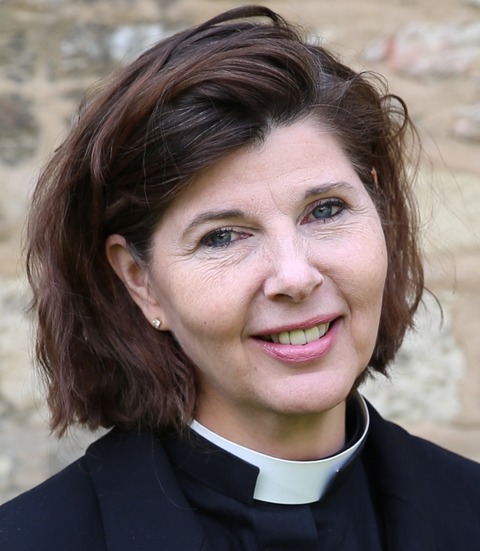| View this email online if it doesn't display correctly |
| | |
|
|
|
| | |  |
When I arrived at St Mary’s in 2004 there was an icon in the chancel, up by our high altar, depicting the Holy Trinity by the Russian artist Andrei Rublev (1370-1430). The icon showed three angels who appeared to Abraham as a portent of the Father, Son and Holy Spirit. Through its beauty and symbolism it revealed a profound spiritual truth – the mysterious reality of God’s presence in human life. Signs embedded within it could guide us on our journey through ‘the window’ into heaven. To learn more about this religious artform, its history and impact on our religious life you can attend Christ Church’s ‘icon day’ on 25th January. If interested contact Jacqueline Holderness at jacqueline.holderness@chch.ox.ac.uk . It promises to be a fascinating day.
You can also visit the Ashmolean Museum which houses another favourite icon of mine. The Virgin Eleousa (of Tenderness) portrays the Mother and her Child with cheeks touching. Its deep dark colour and very soft, tender illustration shows Jesus as having equal maturity and status, even though still a baby, as his mother.
Maybe tomorrow night at 7.30pm when I am ‘in conversation’ with Brian Mountford I can ask what happen to our icon!
The Revd Charlotte Bannister-Parker
Acting Priest-in-charge
|
| | Services
—Tuesdays & Thursdays at 12.15pm
Lunchtime Eucharist —
Sunday 22nd January Epiphany 10.30am - Choral Eucharist
Preacher - Revd Charlotte Bannister - Parker Music: Mass: Mozart: Coronation Mass, K317
Bach, Lobet den Herrn, BWV 230
|
| | | | Reflection Morning
There will be a reflection morning in the Old Library at 10.30am on Saturday 21st January. We'll be continuing discussions from Advent in the light of the incarnation. Please do join us.
|
| | | Press and Pressure- How do journalists cope with stress?
Starts this Thursday 7.30pm in the Vaults and Garden café. This week: Bill Heine, BBC broadcaster. Heine is not afraid of controversy nor of speaking his mind. He has a reputation for entertaining, insightful and sometimes shocking interviews with the likes of Tony Blair, Richard Attenborough and Richard Dawkins. Please email universitychurch@ox.ac.uk to reserve a place.
|
| | | On Liberalism, 25th January, 7.30pm, Old Library
Our speaker will be Michael Freeden, author of the very short introduction on Liberalism.
For some, liberalism is a unitary tradition that has developed and matured over centuries. But it is also a site of inconclusive arguments among libertarians, social liberals and neoliberals. And parts of it have permeated into other ideologies with greater or lesser impact. Is the concept of liberalism indeterminate or does it possess clear internal coherence?
|
| | | Ecumenical service for Christian Unity at Christ Church Cathedral
The service will take place at 6pm on Sunday 22 January. Its theme will be 'Our common calling: to care for the earth and all its inhabitants’. Young people from schools and churches across Oxford, together with the artist Nicholas Mynheer, will provide a visual focus for the service. It would be great to have people from SMV there, as we are part of Churches Together in Central Oxford, who have helped to organise it.
|
| | | Homelessness Sunday, St Giles’ Homelessness Trail
For Homelessness Sunday St Giles are organising a sponsored “Homelessness Trail” starting at St Giles’ Church at 12noon on 22nd January. Speak to Victoria Mort or Revd Andrew Bunch for more details.
|
| | Forthcoming Concerts & Other Events
Saturday 21st January, 7.30pm: Oxford Sinfonia Peter Bassano conductor
Mozart arias with soprano Nika Goric
Mozart symphony no 39
Beethoven symphony no 2
Check out our website and Facebook pages for more events.
|
| |
| |
| | | Poetry Corner
My own heart let me more have pity on; let
Me live to my sad self hereafter kind,
Charitable; not live this tormented mind
With this tormented mind tormenting yet.
I cast for comfort I can no more get
By groping round my comfortless, than blind
Eyes in their dark can day or thirst can find
Thirst's all-in-all in all a world of wet.
Soul, self; come, poor Jackself, I do advise
You, jaded, let be; call off thoughts awhile
Elsewhere; leave comfort root-room; let joy size
At God knows when to God knows what; whose smile
's not wrung, see you; unforeseen times rather — as skies
Betweenpie mountains — lights a lovely mile.
Gerard Manley Hopkins (1854–1863)
On Monday night the Cumbrian poet Jacob Polley won the TS Eliot prize for his collection Jackself (Picador). It is named after this untitled poem by Hopkins (one of the four ‘Terrible Sonnets’, written as Hopkins was emerging from a dark period). Polley’s wonderful, mysterious, unsettling collection is, to quote the blurb, ‘a kind of 'fictionalized autobiography' through nursery rhymes, riddles and cautionary tales, and through the many 'Jacks' of our folktale, legend, phrase and fable - everyman Jacks and no one Jacks, Jackdaw, Jack-O-Lantern, Jack Sprat, Cheapjack and Jack Frost’. It is the narrative of a coming-of-age, of a soul plunged to depths and, somehow (and piecemeal), recovered. It is a work of light dappling the shadows, of transformation, transience and ineffability rendered through nature and innermost thoughts. Like Hopkins’ invented word ‘betweenpie’ (as though to ‘pie’, or dapple, something is a verb, and he catches the skies in the act of mottling the mountains), Polley’s book plays on the mutable, on the light that is found within the dark.
|
|
|